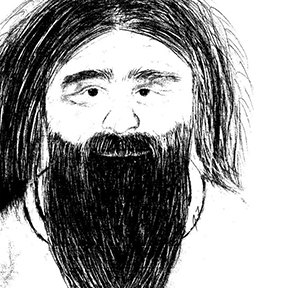
After six months he began the journey back to his monastery. By then, his beard had grown quite long. The monks there, he knew, were clean-shaven and as he descended the mountain trail he pondered this and considered the prospect of shaving. He realized that, even if he had a razor to shave with, he felt no need to do so. He soon approached the grey brick monastery, its large central meditation hall and many smaller outlying buildings speckling the mountainside, and the question of hair was right in front of his eyes. Literally and figuratively.
Upon arriving, he went right to bed, avoiding as many of his fellow monks as possible. In the morning he visited the Abbot of the monastery and asked what he should do. Shave? Don't shave?
His teacher sat in silence for a few minutes then got up from his meditation cushion and exited the room, leaving him alone. What was this? He had just asked his teacher a question and, without even a word, he had just walked away! He sat and waited, though he wasn't sure why.
As frustration grew, the master suddenly returned and sat down in front of him. The young monk looked at him with an expectant, and a bit exasperated, expression but said nothing. Tendrils of frustration tugged at him. His teacher recognized them and, returning the gaze, said calmly, "Had to pee. Too much tea, you know."
The young man continued to stare at him expectantly. The abbot waited a bit for his disciple to contemplate things and come to a conclusion. But it didn't happen. Finally, he said, "When we have to pee, there is no decision, no dilemma, no problem. No choice. We just do it."
Again, he paused, waiting to see if a spark of understanding was creeping into the young monks’ eyes, but all he saw was silent incomprehension. So he continued, "To pee is not a choice; it is something we cannot choose to do. You can only delay when, not whether-or-not, to pee. To shave is a choice, but not an important choice. A most inconsequential choice, in fact. If, today, you choose to shave, it will just begin to come back tomorrow. If you choose to not shave, nothing for you or your world will be any different from the way it is right now. What are you seeking?" Then the master suddenly stretched out his arm and grabbed the young monk's chin-hairs. As he tugged at them the monk shrieked, "Ow!"
Suddenly, the young monk burst into uncontrollable laughter. After recovering, he stood, bowed to the abbot, and left, leaving his master with a smile.
